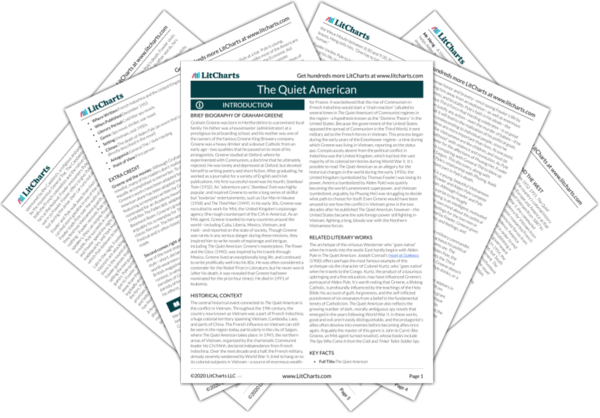Summary
Analysis
Fowler leaves a note at the American Legation, asking Pyle to come to his flat to talk. While he waits for Pyle to receive the note he goes to have a drink at the Continental. He sees workers repairing the damage caused by the explosion a few days ago. After drinking for a while, he returns to his flat, and reads. He hopes that Pyle won’t come.
The sight of the aftermath of the explosion reminds Fowler of why he wants Pyle dead—or at least one of the reasons he wants Pyle dead.
Themes
There is a knock at the door, and Fowler finds Dominguez waiting outside his flat. Dominguez asks Fowler if there’s anything for him to do, but Fowler sends Dominguez away. Shortly thereafter, Pyle arrives, accompanied by his dog, Duke. Fowler invites them both inside.
The fact that Fowler sends Dominguez reminds us of how focused he’s become on doing away with Pyle, even if he’d never admit this to himself.
Themes
Inside Fowler’s flat, Pyle explains that he’s seen General Thé that afternoon. He insists that the people of Vietnam aren’t complicated—indeed, they’re like children. Fowler laughs and explains to Pyle that all children are complicated. Pyle goes on to say that “we” are taking care of the relatives of the victims of his explosion. Fowler interrupts Pyle and asks him to dinner on the Vieux Moulin. Pyle accepts the invitation.
In the hours before his death, Pyle provides something of a summary of his beliefs—he considers the Vietnamese to be children, incapable of making decisions for themselves. This is also consistent with the way Pyle has treated Phuong all along—with condescension disguised as romance and chivalry. Fowler, while certainly no saint, at least defends the complex humanity of the Vietnamese.
Themes
Pyle and Fowler continue to chat in Fowler’s flat. Pyle mentions that his father is a professor and a disciple of Darwin. Fowler mentions that he might like Pyle’s father, since they’re both isolationists. Pyle continues talking about his family—and as he talks, Fowler contemplates warning him about Heng’s plot. He asks Pyle if he carries a gun, and Pyle says that he doesn’t.
Almost unknowingly, Pyle is making it more difficult for Fowler to kill him. Pyle describes his family, reminding Fowler of the misery he’ll cause to Pyle’s father after Pyle dies.
Themes
Get the entire The Quiet American LitChart as a printable PDF.

Pyle points out that he’s been talking too much—he senses that something strange is happening that night. Fowler suggests that they cancel the dinner, a suggestion that Pyle dismisses. Fowler reminds Pyle that he saved his life, and Pyle shrugs. He praises Fowler for staying neutral in Vietnam, even after he hurt his leg at the fort. Unexpectedly, he then insists that the victims of his bombings have only been casualties, dying for the “right cause”—for democracy. Fowler finds this absurd.
It’s ironic that Pyle praises Fowler for staying neutral at precisely the moment when Fowler is definitively not neutral anymore (if, indeed, he ever was). It seems clear enough that Fowler is right to scoff at Pyle’s heartless “tyranny of ideas,” but this doesn’t mean that Fowler is right to kill Pyle.
Themes
As he talks to Fowler, Pyle accidentally knocks over a glass—he seems nervous. Fowler helps him clean up the mess, and tells him that he’s going to see a film at the Majestic, the local theater, before they dine together. He stresses that if Pyle can’t make it to dinner, it won’t be a problem. Pyle insists that he’ll be there. He leaves, accompanied by his dog.
Fowler wants it both ways: he wants to kill Pyle, but he doesn’t want to suffer the consequences of killing him (guilt, mostly.). In this way, he invites Pyle to dinner, then makes a pathetic attempt to dissuade him from coming to dinner (if Fowler really wanted to save Pyle’s life, he could just reschedule or warn him).
Themes












